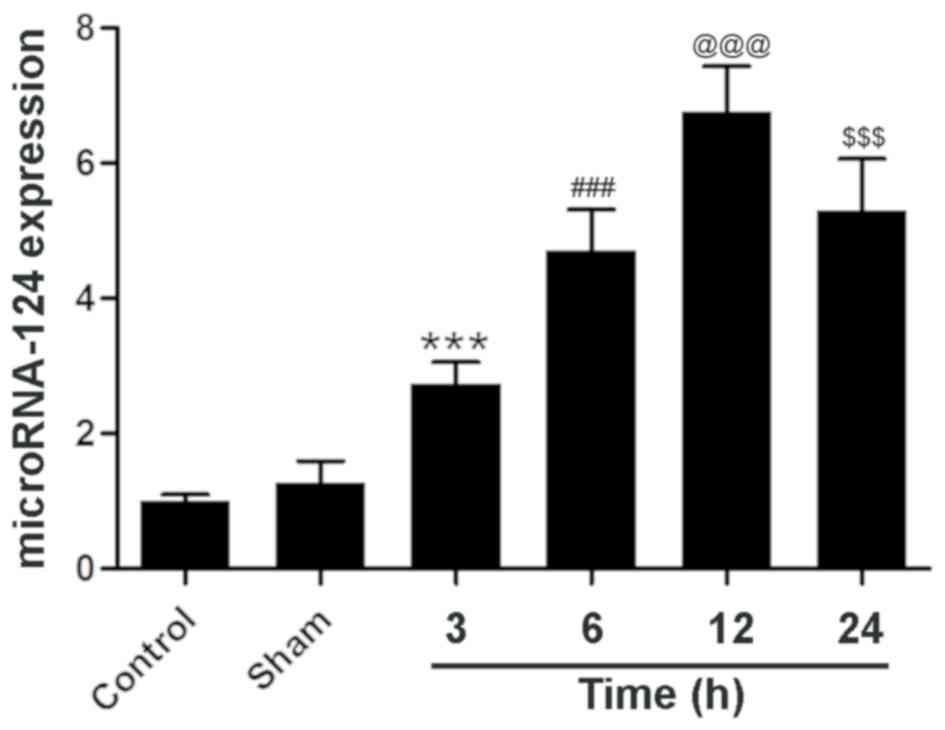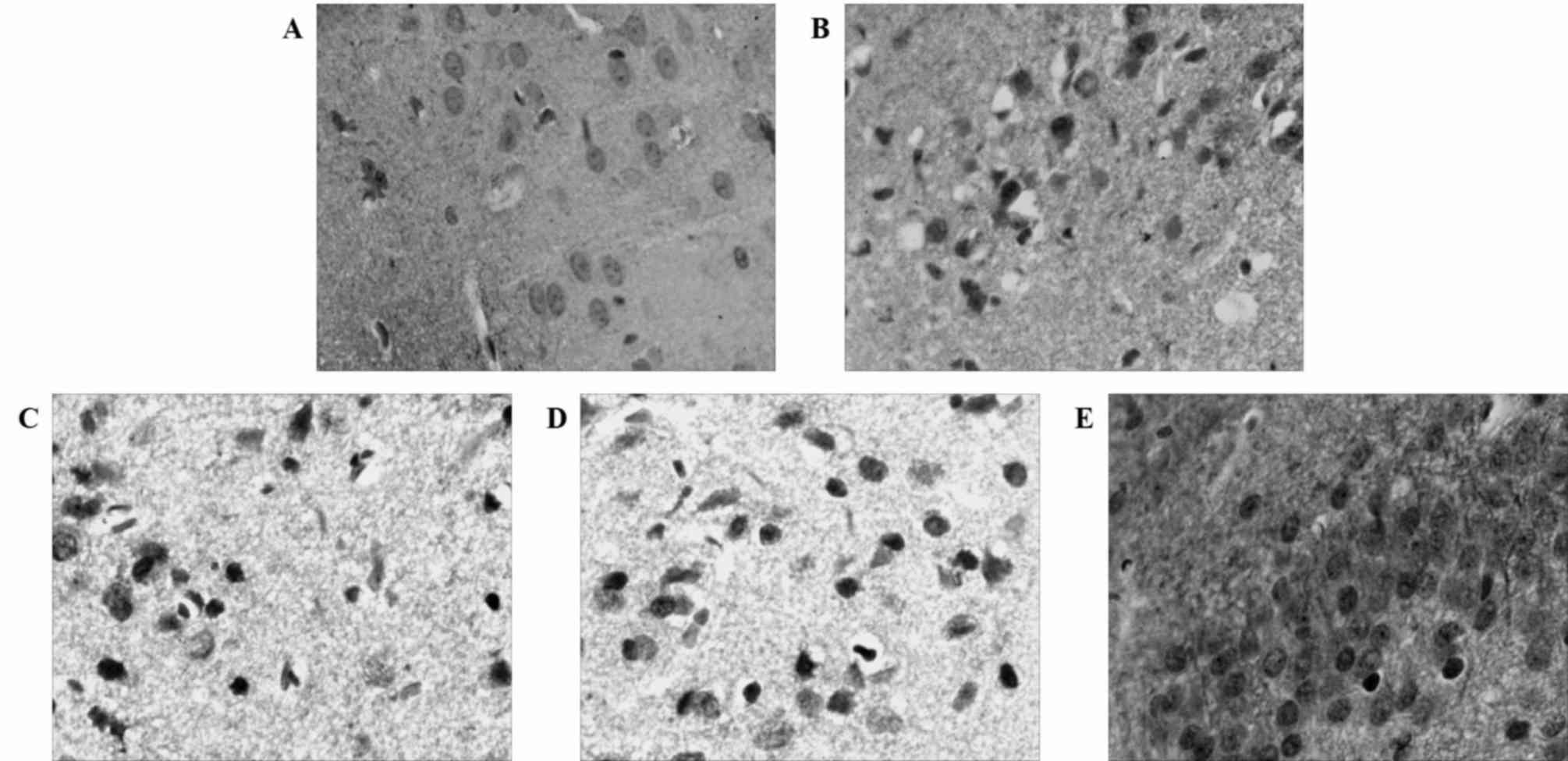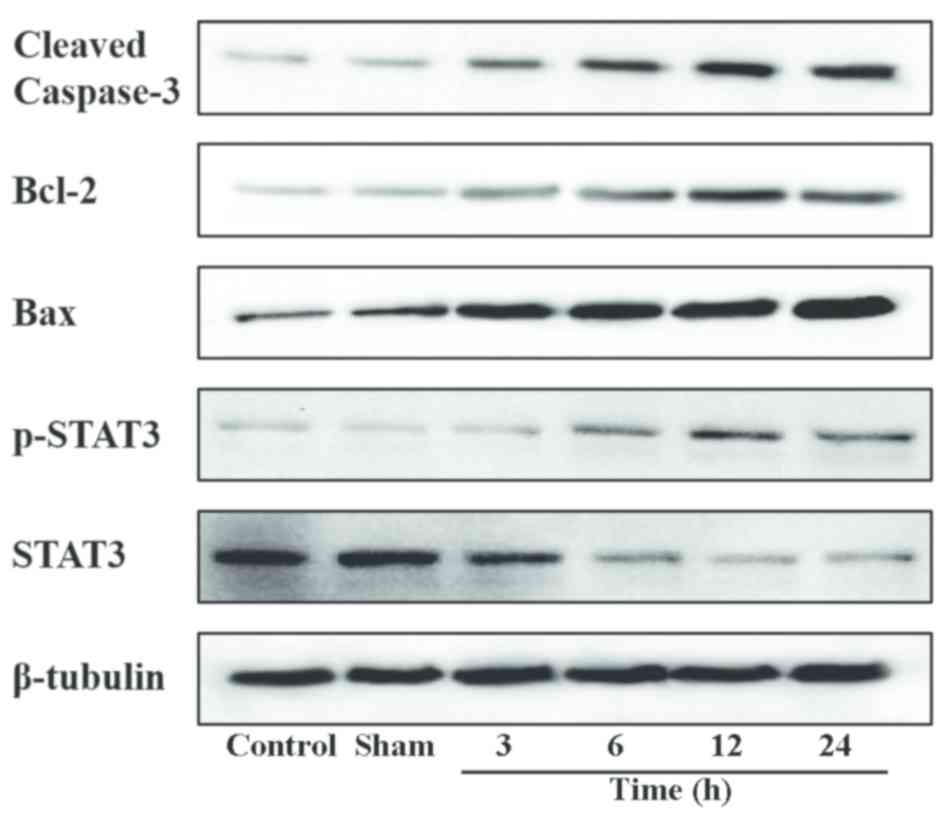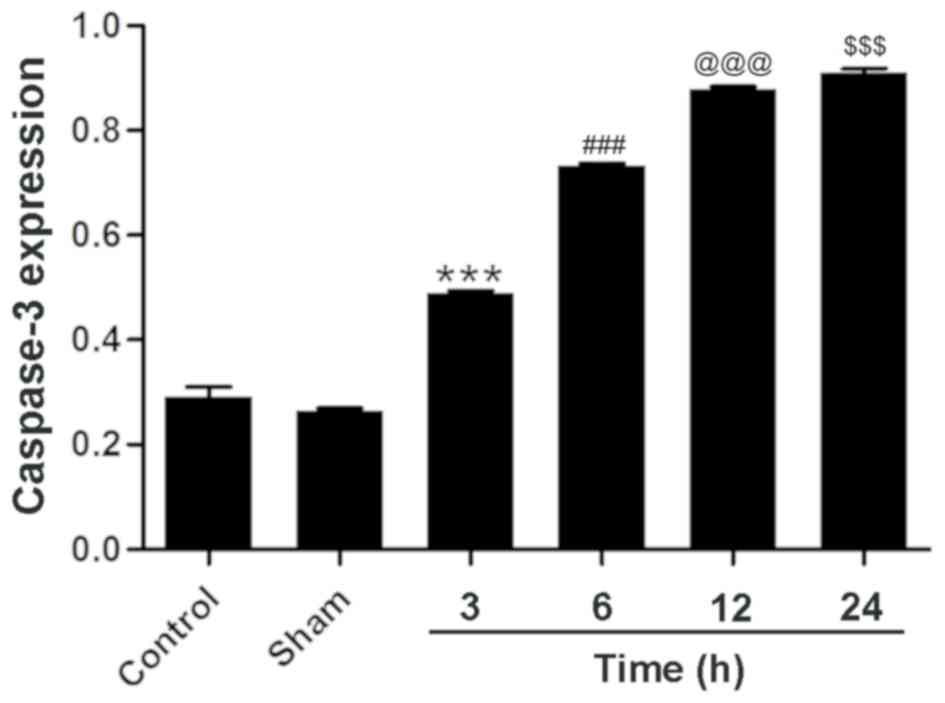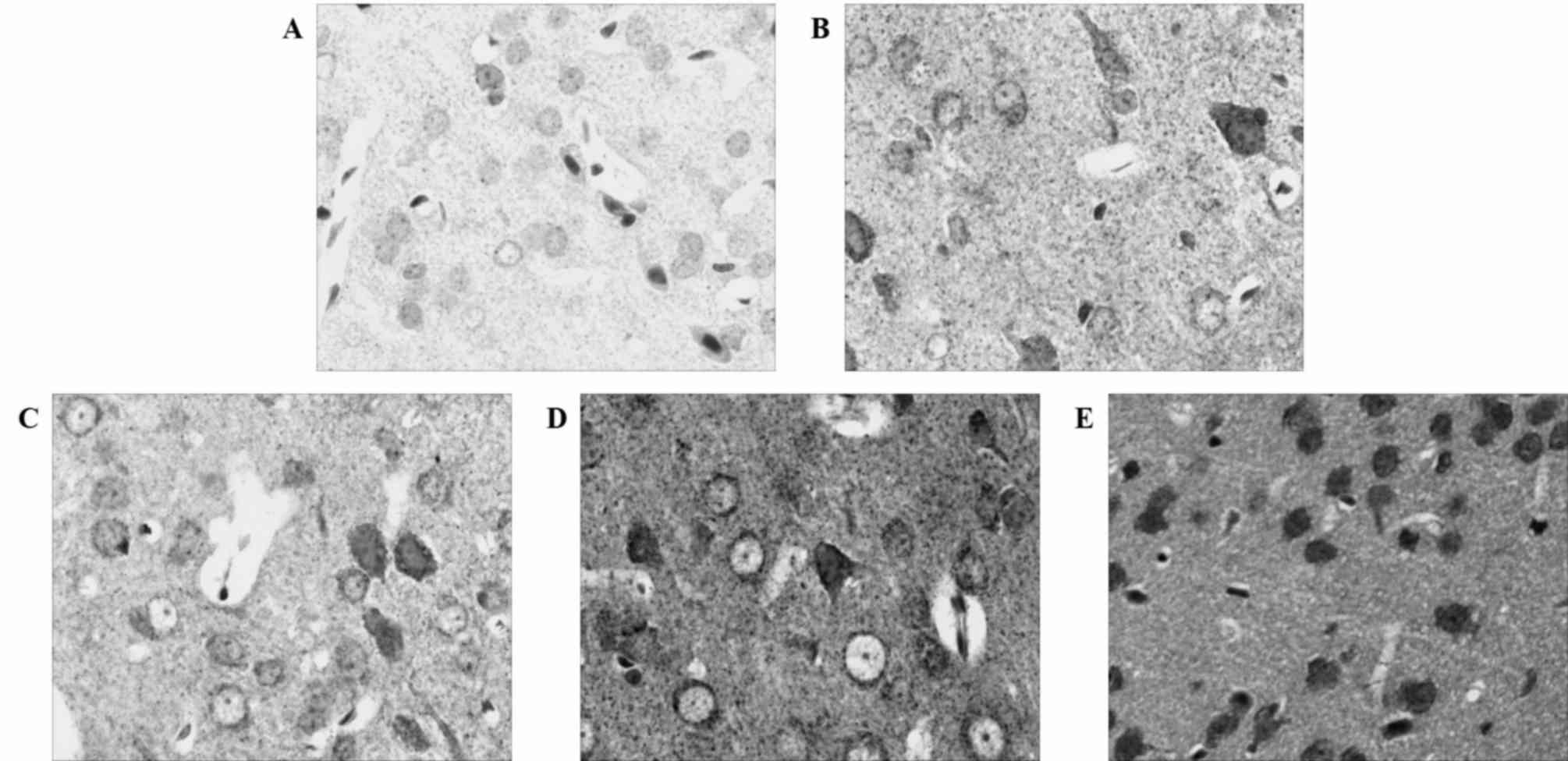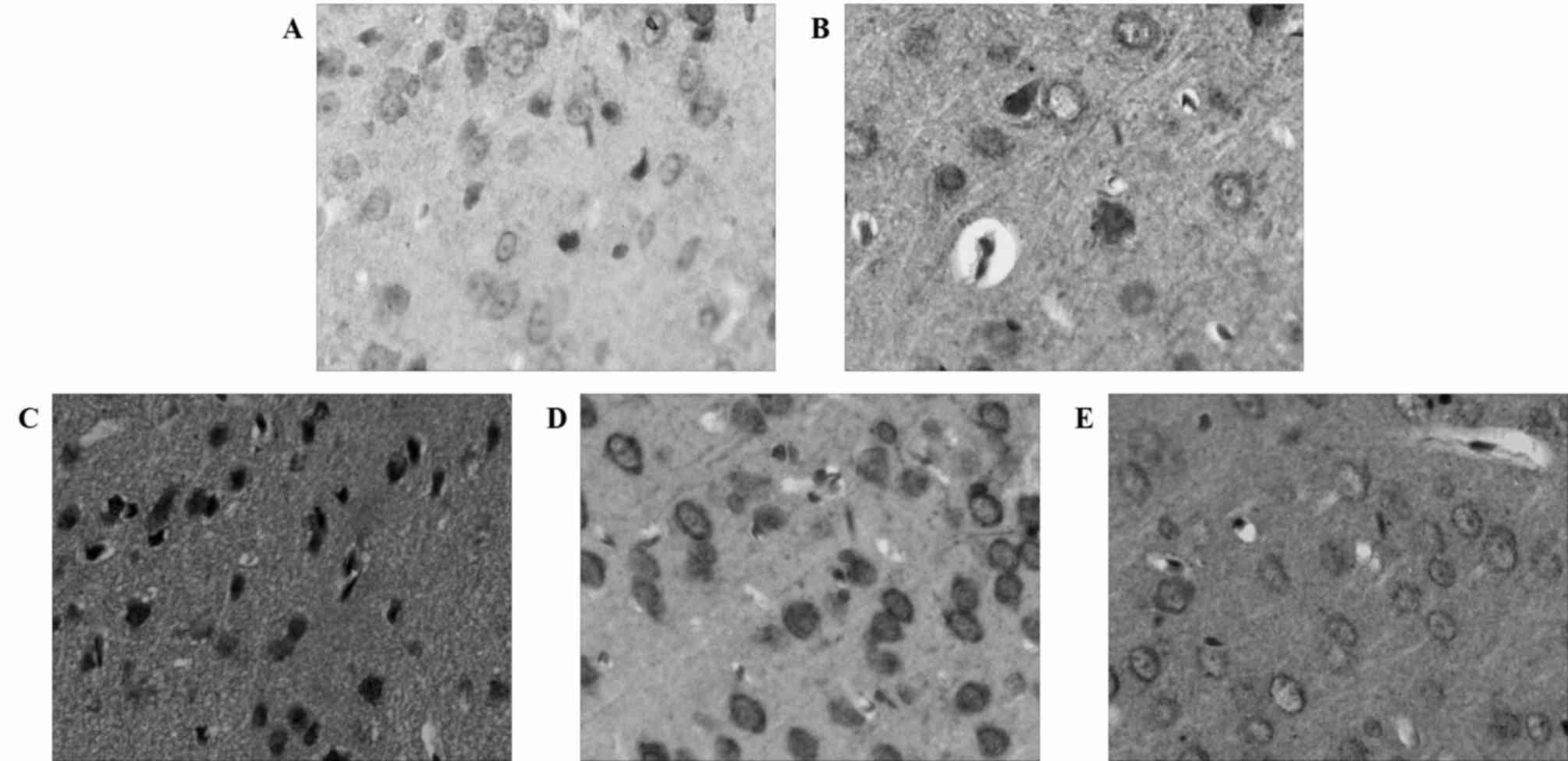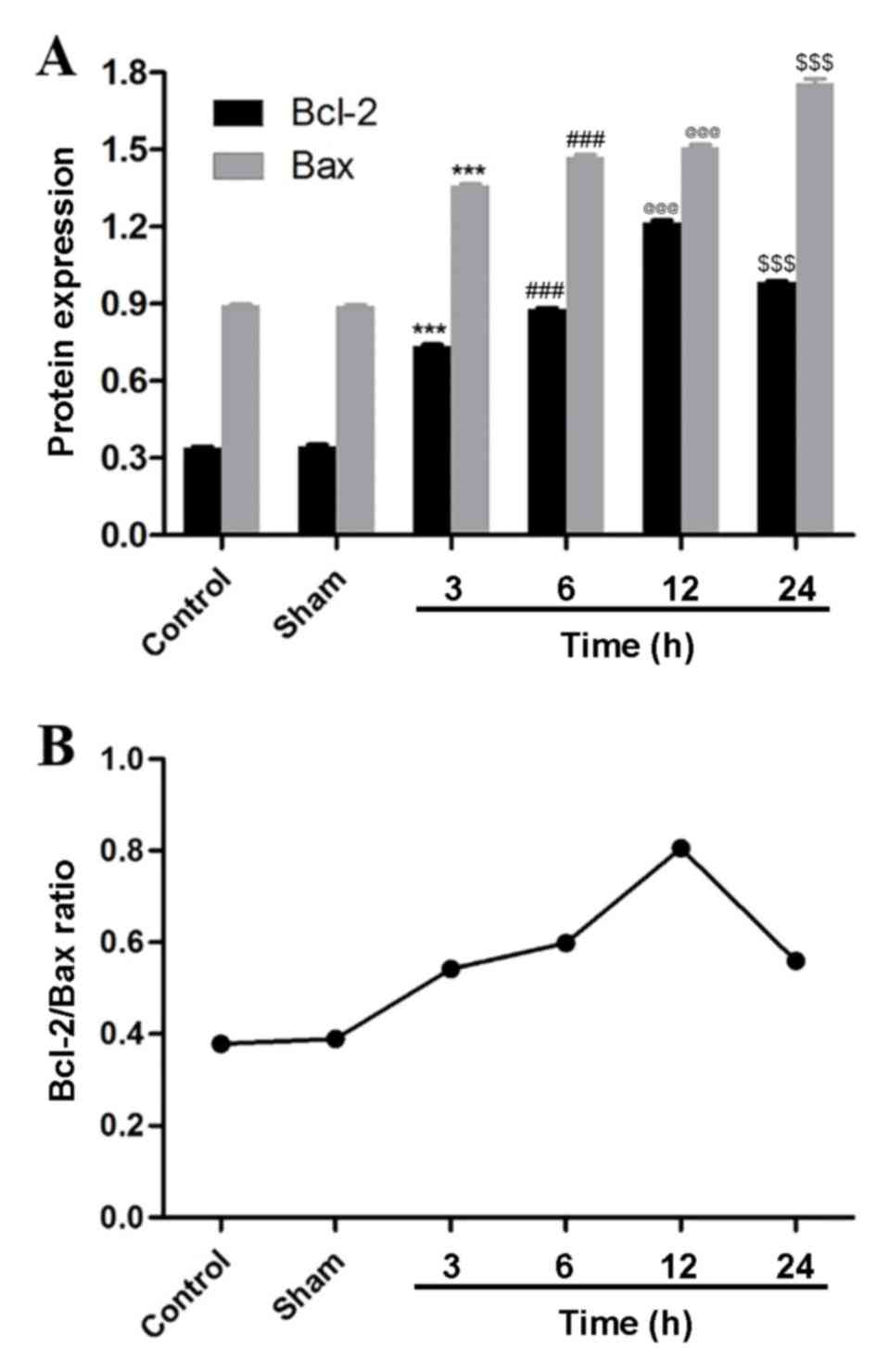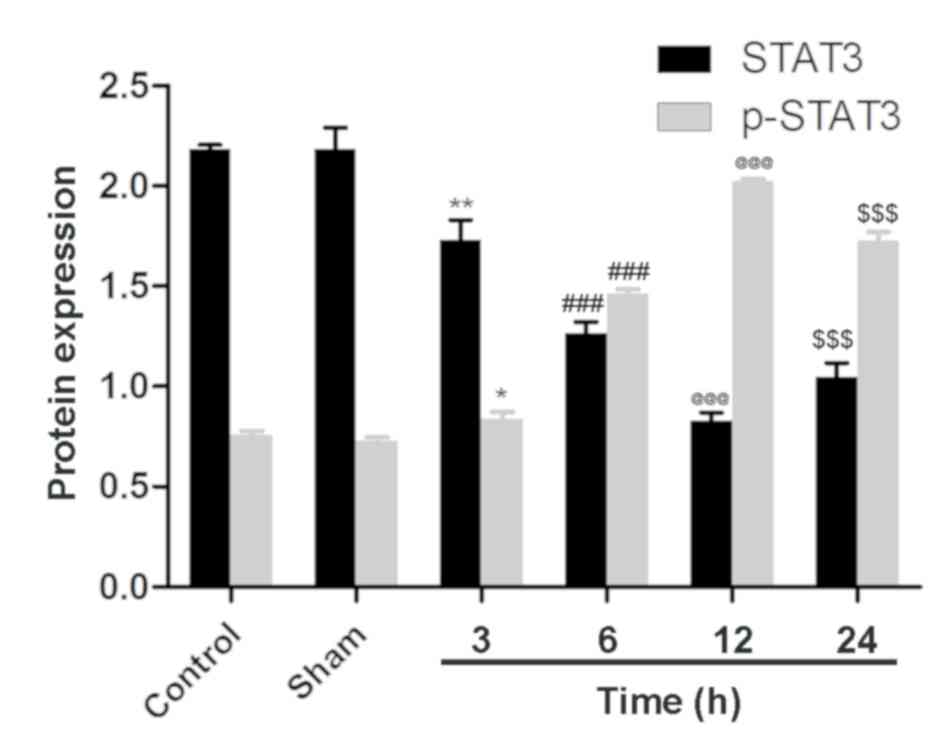|
1
|
Flynn RW, MacWalter RS and Doney AS: The
cost of cerebral ischemia. Neuropharmacology. 55:250–256. 2008.
View Article : Google Scholar : PubMed/NCBI
|
|
2
|
Mehta SL, Manhas N and Raghubir R:
Molecular targets in cerebral ischemia for developing novel
therapeutics. Brain Res Rev. 54:34–66. 2007. View Article : Google Scholar : PubMed/NCBI
|
|
3
|
Ji HJ, Wang DM, Hu JF, Sun MN, Li G, Li
ZP, Wu DH, Liu G and Chen NH: IMM-H004, a novel courmarin
derivative, protects against oxygen- and
glucose-deprivation/restoration-induced apoptosis in PC12cells. Eur
J Pharmacol. 723:259–266. 2014. View Article : Google Scholar : PubMed/NCBI
|
|
4
|
Endres M, Engelhardt B, Koistinaho J,
Lindvall O, Meairs S, Mohr JP, Planas A, Rothwell N, Schwaninger M,
Schwab ME, et al: Improving outcome after stroke: Overcoming the
translational roadblock. Cerebrovasc Dis. 25:268–278. 2008.
View Article : Google Scholar : PubMed/NCBI
|
|
5
|
Liu DM, Wang ZH, Liu L, Zhang XM and Lou
FL: Acetylpuerarin increases cell viability and reduces apoptosis
in rat hippocampal neurons following oxygen-glucose
deprivation/reperfusion. Mol Med Rep. 8:1453–1459. 2013. View Article : Google Scholar : PubMed/NCBI
|
|
6
|
Li D, Shao Z, Vanden Hoek TL and Brorson
JR: Reperfusion accelerates acute neuronal death induced by
simulated ischemia. Exp Neurol. 206:280–287. 2007. View Article : Google Scholar : PubMed/NCBI
|
|
7
|
Di Y, Lei Y, Yu F, Changfeng F, Song W and
Xuming M: MicroRNAs expression and function in cerebral ischemia
reperfusion injury. J Mol Neurosci. 53:242–250. 2014. View Article : Google Scholar : PubMed/NCBI
|
|
8
|
Hu Y, Deng H, Xu S and Zhang J: MicroRNAs
regulate mitochondrial function in cerebral ischemia-reperfusion
injury. Int J Mol Sci. 16:24895–24917. 2015. View Article : Google Scholar : PubMed/NCBI
|
|
9
|
Min XL, Wang TY, Cao Y, Liu J, Li JT and
Wang TH: MicroRNAs: A novel promising therapeutic target for
cerebral ischemia/reperfusion injury. Neural Regen Res.
10:1799–1808. 2015. View Article : Google Scholar : PubMed/NCBI
|
|
10
|
Fasanaro P, Greco S, Ivan M, Capogrossi MC
and Martelli F: MicroRNA: Emerging therapeutic targets in acute
ischemic diseases. Pharmacol Therape. 125:92–104. 2010. View Article : Google Scholar
|
|
11
|
Sun Y, Gui H, Li Q, Luo ZM, Zheng MJ, Duan
JL and Liu X: MicroRNA-124 protects neurons against apoptosis in
cerebral ischemic stroke. CNS Neurosci Ther. 19:813–819.
2013.PubMed/NCBI
|
|
12
|
Liu X, Li F, Zhao S, Luo Y, Kang J, Zhao
H, Yan F, Li S and Ji X: MicroRNA-124-mediated regulation of
inhibitory member of apoptosis-stimulating protein of p53 family in
experimental stroke. Stroke. 44:1973–1980. 2013. View Article : Google Scholar : PubMed/NCBI
|
|
13
|
Doeppner TR, Doehring M, Bretschneider E,
Zechariah A, Kaltwasser B, Müller B, Koch JC, Bähr M, Hermann DM
and Michel U: MicroRNA-124 protects against focal cerebral ischemia
via mechanisms involving Usp14-dependent REST degradation. Acta
Neuropathol. 126:251–265. 2013. View Article : Google Scholar : PubMed/NCBI
|
|
14
|
Sun Y, Luo ZM, Guo XM, Su DF and Liu X: An
updated role of microRNA-124 in central nervous system disorders: A
review. Front Cellular Neurosci. 9:1932015. View Article : Google Scholar
|
|
15
|
Taniguchi K, Sugito N, Kumazaki M,
Shinohara H, Yamada N, Nakagawa Y, Ito Y, Otsuki Y, Uno B, Uchiyama
K, et al: MicroRNA-124 inhibits cancer cell growth through
PTB1/PKM1/PKM2 feedback cascade in colorectal cancer. Cancer Lett.
363:17–27. 2015. View Article : Google Scholar : PubMed/NCBI
|
|
16
|
Sun Y, Ai X, Shen S and Lu S:
NF-κB-mediated miR-124 suppresses metastasis of non-small-cell lung
cancer by targeting MYO10. Oncotarget. 6:8244–8254. 2015.
View Article : Google Scholar : PubMed/NCBI
|
|
17
|
Xi ZW, Xin SY, Zhou LQ, Yuan HX, Wang Q
and Chen KX: Downregulation of rho-associated protein kinase 1 by
miR-124 in colorectal cancer. World J Gastroenterol. 21:5454–5464.
2015. View Article : Google Scholar : PubMed/NCBI
|
|
18
|
Li X, Yi S, Deng Y, Cheng J, Wu X, Liu W,
Tai Y, Chen G, Zhang Q and Yang Y: MiR-124 protects human hepatic
L02 cells from H2O2-induced apoptosis by
targeting Rab38 gene. Biochem Biophys Res Commun. 450:148–153.
2014. View Article : Google Scholar : PubMed/NCBI
|
|
19
|
Kwiatkowski K, Piotrowska A, Rojewska E,
Makuch W and Mika J: The RS504393 influences the level of
nociceptive factors and enhances opioid analgesic potency in
neuropathic rats. J Neuroimmune Pharmacol. 12:402–419. 2017.
View Article : Google Scholar : PubMed/NCBI
|
|
20
|
Longa EZ, Weinstein PR, Carlson S and
Cummins R: Reversible middle cerebral artery occlusion without
craniectomy in rats. Stroke. 20:84–91. 1989. View Article : Google Scholar : PubMed/NCBI
|
|
21
|
Bederson JB, Pitts LH, Tsuji M, Nishimura
MC, Davis RL and Bartkowski H: Rat middle cerebral artery
occlusion: Evaluation of the model and development of a neurologic
examination. Stroke. 17:472–476. 1986. View Article : Google Scholar : PubMed/NCBI
|
|
22
|
Jia D, Han B, Yang S and Zhao J: Anemonin
alleviates nerve injury after cerebral ischemia and reperfusion
(I/R) in rats by improving antioxidant activities and inhibiting
apoptosis pathway. J Mol Neurosci. 53:271–279. 2014. View Article : Google Scholar : PubMed/NCBI
|
|
23
|
Livak KJ and Schmittgen TD: Analysis of
relative gene expression data using real-time quantitative PCR and
the 2−ΔΔCT method. Methods. 25:402–408. 2001. View Article : Google Scholar : PubMed/NCBI
|
|
24
|
Riedl SJ and Shi Y: Molecular mechanisms
of caspase regulation during apoptosis. Nat Rev Mol Cell Biol.
5:897–907. 2004. View
Article : Google Scholar : PubMed/NCBI
|
|
25
|
Zhu JR, Tao YF, Lou S and Wu ZM:
Protective effects of ginsenoside Rb3 on oxygen and glucose
deprivation-induced ischemic injury in PC12 cells. Acta Pharmacol
Sin. 31:273–280. 2010. View Article : Google Scholar : PubMed/NCBI
|
|
26
|
Murphy KM, Ranganathan V, Farnsworth ML,
Kavallaris M and Lock RB: Bcl-2 inhibits Bax translocation from
cytosol to mitochondria during drug-induced apoptosis of human
tumor cells. Cell Death Differ. 7:102–111. 2000. View Article : Google Scholar : PubMed/NCBI
|
|
27
|
Youle RJ and Strasser A: The BCL-2 protein
family: Opposing activities that mediate cell death. Nat Rev Mol
Cell Biol. 9:47–59. 2008. View
Article : Google Scholar : PubMed/NCBI
|
|
28
|
Zhou H, Zhang Z, Wei H, Wang F, Guo F, Gao
Z, Marsicano G, Wang Q and Xiong L: Activation of STAT3 is involved
in neuroprotection by electroacupuncture pretreatment via
cannabinoid CB1 receptors in rats. Brain Res. 1529:154–164. 2013.
View Article : Google Scholar : PubMed/NCBI
|
|
29
|
Lin Y, Cai B, Xue XH, Fang L, Wu ZY and
Wang N: TAT-mediated delivery of neuroglobin attenuates apoptosis
induced by oxygen–glucose deprivation via the Jak2/Stat3 pathway in
vitro. Neurol Res. 37:531–538. 2015. View Article : Google Scholar : PubMed/NCBI
|
|
30
|
Li L, Li H and Li M: Curcumin protects
against cerebral ischemia-reperfusion injury by activating
JAK2/STAT3 signaling pathway in rats. Int J Clin Exp Med.
8:14985–14991. 2015.PubMed/NCBI
|
|
31
|
Shyu WC, Lin SZ, Chiang MF, Chen DC, Su
CY, Wang HJ, Liu RS, Tsai CH and Li H: Secretoneurin promotes
neuroprotection and neuronal plasticity via the Jak2/Stat3 pathway
in murine models of stroke. J Clin Invest. 118:133–148. 2008.
View Article : Google Scholar : PubMed/NCBI
|















